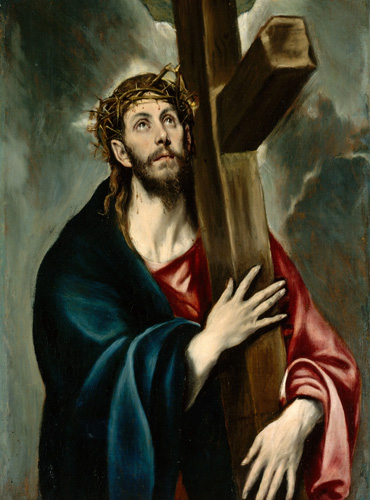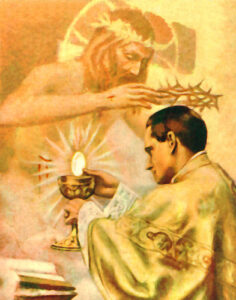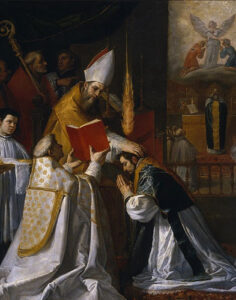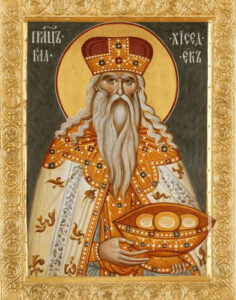Twenty-second Sunday in Ordinary Time – Year A – Jer 20:7-9; Ps 63:2-6,8-9; Rm 12:1-2; Mt 16:21-27
It seems that Saint Peter could have said the words that begin the first reading: “You duped me, O LORD, and I let myself be duped.” This does not mean that, properly speaking, God deceives us. On the contrary, God is the Truth, so He never deceives us. However, we can feel cheated, duped, or fooled, when God does something that surprises us, or something that is out of the ordinary. This is what happened with Saint Peter in the Gospel that we have just heard. Last week, we heard St. Peter’s confession that Christ is the Son of the Living God, and the words of praise, “Blessed are you, Simon, son of John.” But, right after this event, Jesus strongly scolds Saint Peter, telling him, “Get behind me, Satan.”
There are three sayings of Jesus in the gospel that should get our attention, and that are important for our daily lives. First, that “Jesus began to show his disciples that he must go to Jerusalem and suffer greatly from the elders, the chief priests, and the scribes, and be killed and on the third day be raised.” In particular, that word “must” is important, “he must go.” Later, we have His words to Simon Peter: “You are thinking not as God does, but as human beings do.” And finally, we have Christ’s words: “Whoever wishes to come after me must deny himself, take up his cross, and follow me.” “Whoever wishes to come after me must deny himself, take up his cross, and follow me.”
First of all, Matthew tells us that “Jesus began to show his disciples that he must go to Jerusalem and suffer greatly . . . and be killed and on the third day be raised.” That phrase, “must” is very strong in the original. That “must” could be translated as “it was absolutely necessary.” It was absolutely necessary for Christ to suffer, be condemned to death, and rise again, not in the sense that Christ had no other choice, or as if He were not free. Christ was and is perfectly free. However, being condemned, suffering, and dying on the cross was the best way to show His Love to men: “By this means man knows how much God loves him,” writes Saint Thomas Aquinas, “and with this he is invited to love Him, in which consists the perfection of human salvation. From what the Apostle [Saint Paul] says in the letter to the Romans (5,8-9): God proves his love for us in that, while we were still sinners, Christ died for us.” “God so loved the world that he gave his only begotten Son, so that everyone who believes in him may not perish, but may have eternal life,” and “there is no greater love than to lay down one’s life for one’s friends.” What God does, He does in a perfect way, so it is fitting that our salvation be in the most perfect, most complete, and clearest way so that we can love Him. I ask you: if Christ felt so much need to go and suffer so much for us, how do we respond? Do we feel the same need to love Him above all else?
Later, Christ says to Saint Peter: You are thinking not as God does, but as human beings do.” You are thinking not as God does, but as human beings do.” We already know that God is greater than us, and consequently that is also His way of thinking. Through the prophet Isaiah. God said, “‘For my thoughts are not your thoughts, neither are your ways my ways,’ declares the Lord. ‘As the heavens are higher than the earth, so are my ways higher than your ways and my thoughts than your thoughts.’” A great saint of the Church, Saint Thomas Aquinas, spoke of God as “sitting on the mountaintop of eternity,” “sitting on the mountaintop of eternity.” In other words, from the top of a mountain, you can absolutely everything that happens below. Nothing escapes God; God captures everything, even the smallest things. Aquinas also makes a comparison with two servants who go to the market at the request of their boss. The boss sends one, and he sends the other, without notifying them. The servants run into each other in the market, and for them it is a surprise, but for the boss, it was intentional. God is almighty, and knows everything too. He also loves us, and wants all men to be saved. Hence, everything that happens in this world serves to make me a saint and help me get to heaven. Nothing more, nothing less.
This is God’s way of thinking: everything that happens to me in this world is to get me to heaven. Nowadays people are so involved in recycling things, that they know how to make tires from used shoes, or computers from pieces of metal, well, they know how to take advantage of garbage to make something of great value, does God Who is much more intelligent than us, does he not know how to get good out of the bad things in this world?
In this way, we can come to think about our attitude in the face of suffering. When we call out to God, saying, “God, why are you making me suffer this or that?” there is always only one answer. The answer is, “Because I love you, and I want you to be with me, forever in heaven, and I want you to love me more.” Whatever God does or allows, it is because He loves us. Sometimes it is difficult to see it like that, and without a doubt, there are many things that only in heaven can we understand perfectly. However, we know that this is how God works. It is like the work of a surgeon: to see a surgeon cut, wound, cause damage, is frightening. If we didn’t know that he is a surgeon, we would get angry, and we would defend ourselves. In our lives and, above all, in our sufferings, God works as a surgeon, cutting off everything that is not Him, so that we are the image that we should be.
Finally, Christ gives us an ultimatum: “Whoever wishes to come after me must deny himself, take up his cross, and follow me.” There are no spectators in Christianity, and the only prize it deserves to win in this world is the crown of eternal life. Jesus Himself says: “What profit would there be for one to gain the whole world and forfeit his life? Or what can one give in exchange for his life?” We must be holy, and we begin to be holy when we take on the mind of God, when we really begin to see Him as the heavenly Father, who loves us, and wants us to be saved. To save ourselves, we have to give up the things that keep us from following Him, especially sin, because sin never makes us happy. We have to take up the cross of daily sacrifices that can be offered to God, and follow Christ, follow in His footsteps, until we reach heaven.
Today we ask, through the intercession of Mary, Mother of Our Lord and our Mother, for the grace to think as God thinks and, even when we cannot understand what He is doing, the grace to accept and love Him and His adorable will.







